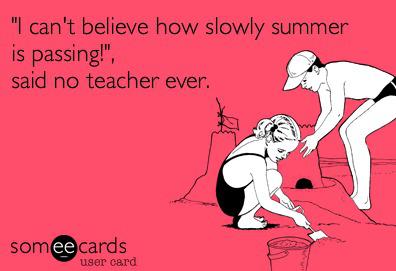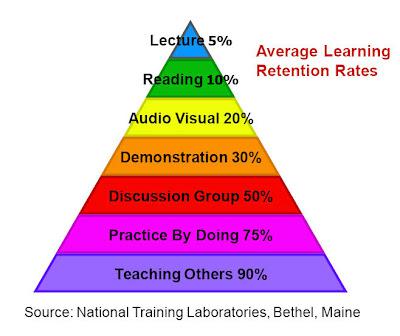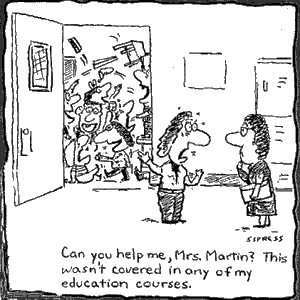
First up, I want to start with one of the biggest concerns for a lot of new teachers; knowing your stuff. I know that when I started my PGCE I was really concerned that we were not going to be taught any 'content' or subject knowledge. A PGCE is just there to teach you how to teach others - they expect you to know your subject pretty well by this point. Now, I don't know about you, but after a year of working in an admin job and not thinking about sociology, the thought to having to teach it to 20-odd teenagers was pretty terrifying. But think about the following:
- You have a degree in the subject you want to teach, as well as (hopefully) a decent level of interest in the subject. This puts you in a good position; even if you may have not studied the specific content of your scheme of work, you have studied at higher level, meaning teaching yourself GCSE/A Level/BTEC (etc) level knowledge will be relatively straightforward.
- Continuing on this point, having been to uni/being older, you will be able to work on your own and to strict deadlines, meaning you understand the importance of hard work, and be able to do it without too much stress.
- You will be surprised at how much you know! Its not until you get into the classroom situation and have to talk through an idea/concept/event to a class of students that you will realize that you really know your stuff! Remember, the best way to learn new stuff is by teaching it to others - you will be a pro in no time!
 Another question I've been asked is how you manage a classroom. I must admit, as I work in a college there tends to be fewer behavioural problems than you may get in say a Secondary school, but we still have general classroom management to deal with. For me, one of the biggest worries is that I wouldn't be able to command a classroom as I am young (24 when I started) and look young. In fact, there have been several occasions in the last year when I have been confused for a student! Note to self, wear staff badge at all times. But in terms of how to make sure you are in control in the classroom, I'm afraid there is no golden answer. I've found the following things helpful however:
Another question I've been asked is how you manage a classroom. I must admit, as I work in a college there tends to be fewer behavioural problems than you may get in say a Secondary school, but we still have general classroom management to deal with. For me, one of the biggest worries is that I wouldn't be able to command a classroom as I am young (24 when I started) and look young. In fact, there have been several occasions in the last year when I have been confused for a student! Note to self, wear staff badge at all times. But in terms of how to make sure you are in control in the classroom, I'm afraid there is no golden answer. I've found the following things helpful however:- Set boundaries; let the students know what is acceptable and unacceptable behavior. Even writing a list of rules at the start of the year - this may seem patronising, but even college students are still young, and are used to being in a school environment where they are told what to do. Making these rules clear will make your life easier.
- Be consistent in both your praise and behavior management - praise good work for all students (not a select few) and you should be consistent in what you count as unacceptable. If you are consistent, then the students will know what to expect and what the boundaries are.
- Start off strict, but not nasty. Yes, I know every old-school teaching textbook says to start strict, and then you will have heard other teachers telling you it's a load of rubbish. Personally, I think that starting off quite firm can be beneficial, but at the same time you should show your personality and don't be too scary. Let them know you're not a pushover, but also that you are a person; one that they can trust and one they should respect. Hopefully, this will mean students don't take the piss. I think this is especially the case for younger teachers; I had to let the students know that I wasn't going to take any shit, but at the same time I'm not an old dragon and we can have a laugh when it's appropriate. You don't have to be mega firm forever, but the first few months are key to developing your classroom relationship.

For me, one of the things I worried about was what if I didn't know the answer to a question from a student. Now, again, remember that you know more than you may think you do! But, if someone asks a question and you don't know the answer, be honest. I've found this has really worked for me; telling the student that they've raised a really interesting point, you don't know the answer, but will get back to them next lesson. This can add depth to your lesson, and work as a good extension task. But remember, don't punish interest by setting extra homework to find out the answer! Another point related to this, is there is no harm in asking your colleagues questions. Many of them will have been teaching for a long time, and have years of experience and knowledge under their belt. No one expects you to know everything (content wise) or know how to deal with every situation. There is no shame in asking for help - it is a great way to strengthen your understanding and show that you are willing to learn and improve. On to the important stuff... what to wear! I only really have experience of working in colleges (the one I'm in now and where I did my teaching practice), where it is usually more relaxed than schools. There doesn't seem to be a 'dress code' - some wear suits and look pretty smart, others wear jeans, flip flops and tank tops. Again, being young I try to look a little smarter, just to distinguish the boundaries, but still do not wear a suit or anything particularly tailored. My essentials are; black skinny jeans, blazers, tea dresses, boots and smart-ish tops/blouses. I am usually either wearing skinny jeans, a top, blazer and heels, or some sort of dress/tunic with leggings and boots. I try to be as true to me as possible, and wear things that I would usually wear, but I also have some things that are my 'work' clothes. I think the main thing is to wear what you feel comfortable in (and that may mean being super smart so you feel in 'teacher mode') as you will be stood in front of a load of students for most of your day. And play it by ear - see what those around you are wearing, it's all about just sussing it out. It also depends on subjects; being a sociology teacher I am in the classroom everyday, but if you teach sports obviously you'll have a completely different style! These are some outfits I would wear to work...

I think I've covered most of what I wanted to! If you've got this far, I am more than impressed! I think the main thing to stress is don't worry - teaching is a constant learning curve and your first year more so than ever. Take each experience as it comes, and be as reflective as you can; try to think at the end of each day/week/month/term "what did I do that was great" and "what could I have improved on"? These sorts of questions will help you reflect on your practice and developing your teaching style. You can't improve if you don't think back and evaluate what you did (or didn't) do!
 And remember, you have six weeks off every summer! And time off for October half term, Christmas, February half term, Easter, May half term, inset days...I hope this has at least put one person's mind at ease, and please let me know if you have any further questions by leaving a comment or emailing me at [email protected].Good luck!
And remember, you have six weeks off every summer! And time off for October half term, Christmas, February half term, Easter, May half term, inset days...I hope this has at least put one person's mind at ease, and please let me know if you have any further questions by leaving a comment or emailing me at [email protected].Good luck!

